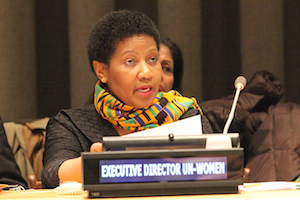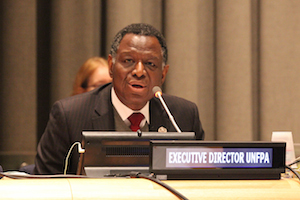Opening statements on gender equality
The discussion on gender equality in the Open Working Group on Sustainable Development in its 8th session (OWG-8) under the agenda item on promoting equality, including social equity, gender equality and women’s empowerment began with two powerful presentations by Phumzile Mlambo-Ngcuka, Executive Director, UN Women and Dr Babatunde Osotimehin, Executive Director, UNFPA.
Summaries of their statements follows below.
 Phumzile Mlambo-Ngcuka, Executive Director, UN Women. Source:http://www.iisd.caPhumzile Mlambo-Ngcuka, Executive Director, UN Women in her presentation referred specifically to agriculture in Africa -- one out of five women is food insecure. Today women farmers have less access to agricultural resources, cannot inherit the land they work on.
Phumzile Mlambo-Ngcuka, Executive Director, UN Women. Source:http://www.iisd.caPhumzile Mlambo-Ngcuka, Executive Director, UN Women in her presentation referred specifically to agriculture in Africa -- one out of five women is food insecure. Today women farmers have less access to agricultural resources, cannot inherit the land they work on.
The post-2015 framework must include rights of all people, men and women, young etc. She referred to the Rio+20 outcome, reaffirming gender equality and the General Assembly resolution calling for the inclusion of a goal on Gender Equality in the new development framework. Women’s rights and women’s empowerment have to be included for the sake of both women and men and to unleash their potential. We are standing at the cross roads, which requires commitment and bolder action. While more girls are going to school, progress remains unacceptably slow. Women continue to earn less pay, with gaps widening in employment. Eight hundred women die daily in childbirth. They are disproportionately affected by climate change. In sub-Saharan Africa women and girls are spending 40 billion hours each year collecting water. She highlighted the need to address child, early and forced marriage and the need for new approaches for transforming gender relations. What is required is a transformative, ambitious and bolder approach that must include a stand-alone gender goal as well as mainstreaming. This was detailed in UN Women paper last year.
Freedom from violence for women and girls is an imperative as it constrains the ability to fulfill potential. Unpaid care work should also be addressed and taken into account, together with social protection. Sexual and reproductive health and rights should be guaranteed across the life cycle. Furthermore, there should be gender equality in decision-making across all areas from the kitchen to the Cabinet in government and to the Board Room. Gender equality should also be included in goals on employment, sustainable energy and in education and health.
Gender equality in the post-2015 development agenda should be aligned to the Beijing Platform for Action as well as the Convention on the Elimination of All Forms of Discrimination against Women (CEDAW). There should be strong accountable mechanisms and the years of insufficient gender statistics should be ended. The post-2015 framework should be bold with an approach to change and transformation of gender relations embedded in it. Finally she urged delegates to make the 21st century the century to achieve equality.
 Babatunde Osotimehin, Executive Director, UN Population Fund (UNFPA). Source: www.iisd.caDr Babatunde Osotimehin, Executive Director, UNFPA articulated what is an important part of human development – people must be at the centre of sustainable development. The world’s population reached 7 billion a few years ago. Half are women and girls. The world is denying itself the potential of women and girls, because of the lack of gender equality. Change is therefore necessary to right the wrongs and gender equality should be reaffirmed as a principle going forward, but within the indivisibility of human rights. We must also ensure that we being about change within our countries. For example, while 140 countries have laws against child marriages, only a few enforce them.
Babatunde Osotimehin, Executive Director, UN Population Fund (UNFPA). Source: www.iisd.caDr Babatunde Osotimehin, Executive Director, UNFPA articulated what is an important part of human development – people must be at the centre of sustainable development. The world’s population reached 7 billion a few years ago. Half are women and girls. The world is denying itself the potential of women and girls, because of the lack of gender equality. Change is therefore necessary to right the wrongs and gender equality should be reaffirmed as a principle going forward, but within the indivisibility of human rights. We must also ensure that we being about change within our countries. For example, while 140 countries have laws against child marriages, only a few enforce them.
The face of the future is a little girl, 10 years old. She is the future of the world but she is denied everything, she is married off even at 10 years old, has a child at 11, develops fistula and is then abandoned. Girls are married before the legal age of 18 years, having children at 15. They are trafficked. Pregnancies in girls between 12 and 18 can result in higher numbers of maternal deaths. We are wasting the lives of women and girls. Why are does it happen that daughters are traded, honour killings take place and acid is thrown at wives. Mahalala came and spoke at the United Nations – there are millions of other girls who are denied access to education. While 800 women die each day for maternity related causes, millions more suffer morbidity from pregnancy. And, is a child, who is a boy, different from a child, who is a girl? We should decide as a community that educational opportunities are available to all. The returns on employing girls, if they have been educated and they have stayed in school, will add zillions of dollars to GDP and development.
We must not forget that MDGs 4, 5, 6 are the MDGs that are lagging behind most. Sexual and reproductive health services are the right of every woman and every girl. In countries where women can make choices about their lives, things can happen in a totally different way. In Rwanda, for example, there are most women in Parliament in the world and also the fastest growing economy today.
I would like to leave you with the picture of 10 year old girl – what will she be like if she can go to schools, become qualified as a medical doctor and decide who and when she will marry? There are now 1.8 billion adolescents of whom half are girls. We must make sure they aren’t trafficked and have access to services and information they need. They should also have access to jobs and to credit and be equal partners.
Questions and response
Questions were put to the two presenters included those on education for girls and integration into the post-2015 development agenda; empowerment of women; violence against women; the role of government in providing remedy for the root causes of the problem.
In reply Ms Mlambo-Ngcuka said that as far as education is concerned the goal should focus quality education, particularly for girls and women. We did well on ‘quantity’ in MDGs but lost in ‘quality’, as teacher training had been neglected. In addition we didn’t address engendering education. Girls don’t go to school when money is a problem. She also called for disaggregated statistics to correlate information to see trends on violence against women and girls, as a barometer to measure what changes are being made to work on improving impact. The problem with the MDGs was that they didn’t look at structural and systemic changes. We need to push more strongly on issue of rights in underlying structures of patriarchy.
Dr Osotimehin recounted the following stories, the first referring to a session at Davos two years ago on people as the centre of development at which all groups identified young people. The average age of the participants was about 62. Young people should have been included likewise women and girls should be part of the discussion of changes that need to be made to put them at the centre of development. He said that one of the problems in bringing about change was that men have not changed. If men do not accept women as being equal nothing is going to happen. He also referred to a project he had visited in Latin America to assist women coffee-growers. The grant they received enabled them to appointed a manager and to grow the business and to export, opening a bank account and to receive profits as dividends. This meant that they had their own resources to pay for food, school fees etc. As one said: “Now he cannot beat me, or can’t touch me, as I can look after myself and my children.”